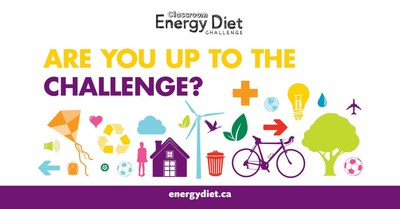|
23.01.2019 23:19:00
|
How Canadian students are learning to refuse, reduce, reuse and recycle
OTTAWA, Jan. 23, 2019 /CNW/ - Imagine your child coming home from school and turning off all the lights that aren't in use with gusto. That same child is also on your case for not using reusable bags when grocery shopping. And be careful not to leave the tap running or you might just get a lecture! For Nancy Gillis, an award-winning Toronto teacher with a passion for environmental literacy, this student sounds like a graduate of the Classroom Energy Diet Challenge. Now in its eight year, this national energy literacy program presented by Canadian Geographic Education and Shell Canada provides K to 12 students across Canada with a fun and engaging competition to help reduce their carbon footprint and become stewards of the environment.

"I encourage all Canadian teachers to enroll in the Classroom Energy Diet Challenge to see the difference this program can make not only in the lives of your students, but also within their families, their school community and surrounding neighbourhood," says Gillis. "We are a part of our own ecosystem and the beauty of the Challenge is the knowledge it brings. By learning how to reduce, reuse, recycle and even refuse, we are more informed about the small acts each of us can do that together make a big difference in helping our planet."
The 16 challenges of the Classroom Energy Diet Challenge teach youth about energy literacy, including how to make a difference by practicing the four Rs: refuse, reduce, reuse, and recycle. The program also provides teachers with resources and incentives to keep students engaged, all while linking back to the curriculum.
In 2018, over the course of three months, classrooms saved more than 750 kilograms of trash from entering our landfills, conserved more than 230,000 litres of water when they took on the Water Works challenge, and went more than 4,500 hours without electricity when they completed the One Hour, No Power challenge!
New this year is a take-home challenge to get students talking about plastic waste with their families. How many plastic bags will students across Canada be able to save with this challenge? Presented by Shell Canada and Canadian Geographic Education, the Challenge has more than 90 prizes up for grabs worth $40,000!
How important is it for Canadians to be more "energy literate" and to integrate energy reduction methods like the 4 R skills as part of their daily lives? According to the Conference Board of Canada, Canada produces more garbage per capita than any other country on earth. Canadians should also take a closer look at their water consumption. When it comes to fresh water use per person, Canada sits in second place among some of the world's top industrialized nations despite the relatively small size of our population, according to the Organization for Economic Cooperation and Development.
Canada'sJill Heinerth, one of the world's top marine explorers and a Royal Canadian Geographical Society's Explorer-in-Residence, is a big fan of the Classroom Energy Diet Challenge. "I've dived in most of the Great Lakes and Canada's oceans and seen the impact of plastic pollution," says Heinerth. "I encourage students and teachers to sign up for the Classroom Energy Diet Challenge. Just a few weekly actions to reduce waste and energy consumption make a difference in the world we share."
Registration for the 2019 Classroom Energy Diet Challenge closes on January 27, 2019. For more information about the competition or how to register, visit www.energydiet.ca.
Social Media Links: @CanGeoEdu, @RCGS_SGRC, @Energy_Lit, @Shell_Canada #energydietchallenge
Shell has been operating in Canada for 108 years and employs about 4,000 people across the country. Our business is providing more and cleaner energy solutions for Canada and the world, and we are one of the largest integrated oil and gas companies in Canada. This means we do everything from exploring for oil and gas, production, refining, the manufacturing process, and delivery to our customers at more than 1,300 retail stations across Canada. Learn more at: www.shell.ca.


SOURCE Royal Canadian Geographical Society
 Der finanzen.at Ratgeber für Aktien!
Der finanzen.at Ratgeber für Aktien!
Wenn Sie mehr über das Thema Aktien erfahren wollen, finden Sie in unserem Ratgeber viele interessante Artikel dazu!
Jetzt informieren!